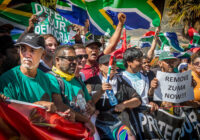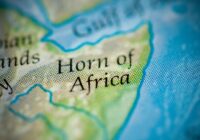The donor community needs to throw its weight behind supporting political reform and utilize its leverage to put pressure on Rwanda to protect citizens’ rights.
The controversial reelection of Rwanda’s President Paul Kagame on August 4 that secured him a third term in power has reignited scrutiny of the small African country. Rwanda is characterized both by its economic and development success and severe democratic deficits, including systematic repression and lack of turnover in political power. Despite the recognized serious civic and human rights issues, the country continues to enjoy international support in the form of high levels of foreign aid from large donors like the United States and United Kingdom. While celebrating Rwanda’s successes, the donor community must also throw its weight behind supporting political reform and utilize its leverage to put pressure on Rwanda to protect citizens’ rights and promote government accountability by rewarding the economic progress that the country has achieved while denouncing the lack of political openness and respect for citizens’ rights.
In recent years, Rwanda has been a popular recipient of donor support due to its successes achieving many Millennium Development Goals and its impressive economic growth. According to the World Bank, between 30% and 40% of Rwanda’s budget is made up of foreign donations. Although Rwanda seems to have been able to reduce poverty and inequality, it remains a state plagued by human rights abuses, suppression of freedom of speech and the killing and disappearance of political dissidents.
Many of the aforementioned issues were brought into sharp focus by the August 2017 election. Kagame was reelected by an incredibly large margin — 98.63% of the vote. In a free and fair election, victory of this magnitude is virtually impossible to achieve. The election has been widely criticized for irregularities and suppression of opposing voices. Opposition candidates were intimidated and harassed, a sign of the closed political space in Rwanda. Kagame has ruled the country for over two decades — simultaneously as vice president and minister of defense since 1994 and president since 2000 — and shows no sign of releasing his grip on power. Thanks to a constitutional amendment that allowed him to continue his rule, Kagame could be in power until 2034. Such consistent abuse of power has inspired many Rwandans to speak out against the government.
There are numerous Rwandan activists who have braved the very real dangers of opposing Kagame’s regime in order to call attention to the dire state of democracy in the country. Diane Shima Rwigara is one such activist. Throughout her career, Rwigara has been a champion for democracy and free political competition. She attempted to run for president against Kagame in 2017, but she was prevented from doing so. After Rwigara announced her candidacy, compromising photographs of her were leaked online, and some of her staff and supporters were harassed and jailed. Many of the signatures she collected to solidify her candidacy were labeled invalid, which disqualified her bid. During the last week of August, Rwigara and her family were taken in for questioning; it has recently been reported that she has been arrested “on charges of tax evasion and forgery.”
There is potential room for influential international actors like the United States to support her work and to call into question the legitimacy of her arrest. This would constitute a bold move toward recognizing Rwanda’s deficits in democracy and human rights and, given the significant amount of aid that the US gives to Rwanda, has a chance of promoting change.
Joseph Sebarenzi, the former president of the Parliament of Rwanda, suggests that the international community utilize a carrot and stick approach in its relations with Rwanda, only offering assistance when certain goals or benchmarks are met. In a personal interview in August 2017, Sebarenzi said that “There will be no peaceful change in Rwanda without the involvement of the international community.” He remains pessimistic about the possibility of democratic turnover in Rwanda, arguing that President Kagame will work to extend his rule unless other states intervene. While formal checks on Kagame’s power exist, in practice the regime has a political chokehold over all branches of government.
While acknowledging that Rwanda has come a long way in many respects during the recovery period post-genocide, there is still a long way to go toward ensuring that the citizens of Rwanda are able to voice their opinions without fear of reprisal from the state. Democratic progress remains visibly lacking. The international community, particularly large donor countries like the United States, should push for human rights and accountable governance, partnering with Rwandan civil society and opposition voices vying for a more free and democratic Rwanda.
*[Young Professionals in Foreign Policy is a partner institution of Fair Observer.]
The views expressed in this article are the author’s own and do not necessarily reflect Fair Observer’s editorial policy.
Photo Credit: Sarine Arslanian / Shutterstock.com
Support Fair Observer
We rely on your support for our independence, diversity and quality.
For more than 10 years, Fair Observer has been free, fair and independent. No billionaire owns us, no advertisers control us. We are a reader-supported nonprofit. Unlike many other publications, we keep our content free for readers regardless of where they live or whether they can afford to pay. We have no paywalls and no ads.
In the post-truth era of fake news, echo chambers and filter bubbles, we publish a plurality of perspectives from around the world. Anyone can publish with us, but everyone goes through a rigorous editorial process. So, you get fact-checked, well-reasoned content instead of noise.
We publish 2,500+ voices from 90+ countries. We also conduct education and training programs
on subjects ranging from digital media and journalism to writing and critical thinking. This
doesn’t come cheap. Servers, editors, trainers and web developers cost
money.
Please consider supporting us on a regular basis as a recurring donor or a
sustaining member.
Will you support FO’s journalism?
We rely on your support for our independence, diversity and quality.







